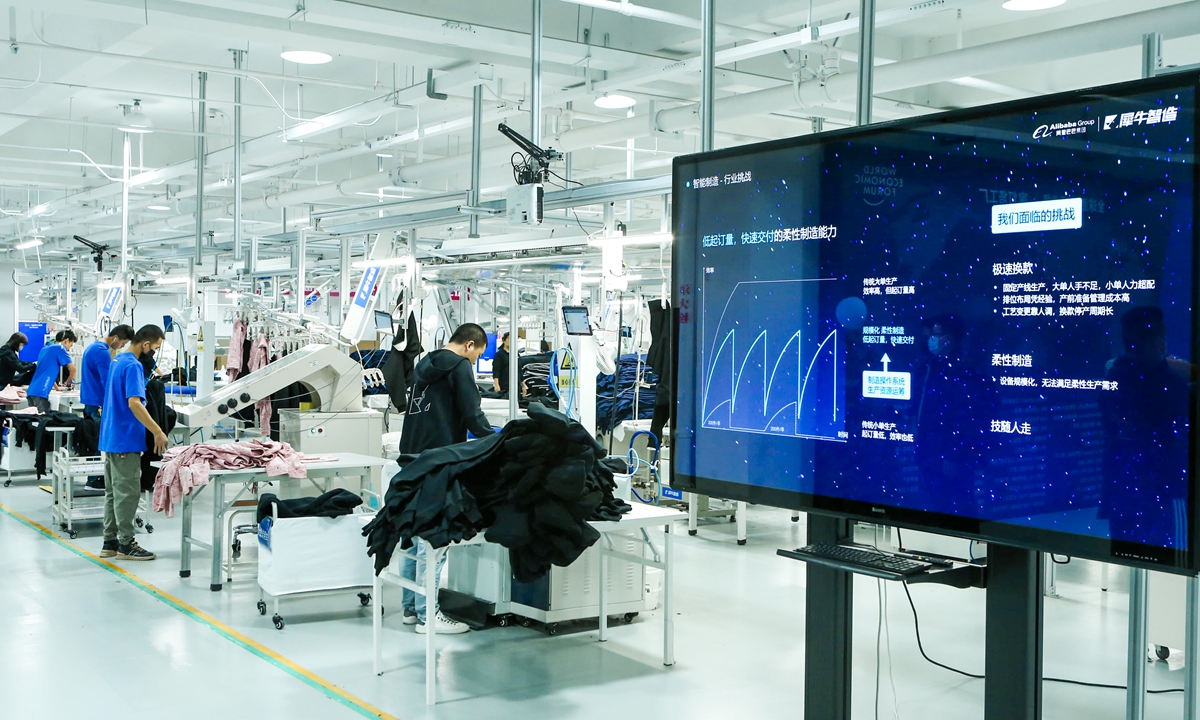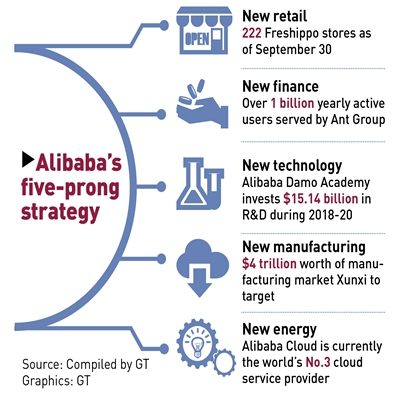China’s e-commerce giant builds smart factory with advanced technologies
Source: Global Times Published: 2020/11/15 18:23:41

Workers inside a Xunxi factory in Hangzhou, East China's Zhejiang Province Photos: Courtesy of Alibaba

Graphics: GT
From the outside, this simple three-story white building in Hangzhou, East China's Zhejiang Province, does not stand out in any way. But once you walk inside, the excitements starts. From the cloth to tailor-made clothes, the entire production process can be finished rapidly with the help of artificial intelligence (AI), robotic arms and other technologies.
Designers can view analog renderings of so-called digital fabrics on a computer screen, without the need for a time-consuming dyeing process. Garment workers have high-tech assistants, such as AI-enabled cutting machines and networked sewing equipment, which help them to fine-tune their work. Managers can track progress remotely on a computer or via a mobile phone, without the need to stay on site.
This is the Xunxi digital factory, a new manufacturing model under Alibaba Group Holding.
Powered by Alibaba's cloud computing infrastructure and internet of things (IoT), the Hangzhou-based factory, which was unveiled in September after three years' preparation, offers small- and medium-sized enterprises (SMEs) a digitalized end-to-end manufacturing system that allows for fully-customized, demand-driven production.
The data and technology used by the Xunxi factory lead to enormous reductions in lead times. It usually takes 90 days for the goods to be ready for delivery to the merchants in store. Now they can decide which products to manufacture and the scale of production within just two weeks, thus reducing the accumulation of inventory.
Alibaba claims to be able to reduce order delivery time by 75 percent through its solution, which will satisfy growing production demands.
The Xunxi showcase comes at a time when the COVID-19 pandemic is catalyzing acceleration in the digital transformation of different industries.
With almost two thirds of businesses surveyed for a new global report currently undertaking a digital transformation program, and another quarter planning one, digitalization is clearly one of the leading strategic priorities for companies globally, a report released by global law firm Baker McKenzie showed on Wednesday.
The report said the pandemic has accelerated this activity for many as the world moves ever more quickly online, and competitive pressures increase.
Chinese policies
Data from the Chinese Ministry of Industry and Information Technology showed that the added value of the manufacturing industry in 2019 reached 26.9 trillion yuan, accounting for 28.1 percent of the world's total, helping China remains as the world's largest manufacturing country for ten consecutive years.
But after 40 years of development, this model is gradually facing challenges from both internal and external aspects.
The labor shortage in domestic manufacturing has increased year by year, becoming a hot topic following the epidemic, with young people no longer satisfied with the income of traditional manufacturing work. Meanwhile, rising labor costs have further led to a new round of production migration from the Chinese manufacturing industry to Southeast Asian countries with lower labor costs.
On the other hand, those developed countries such as Germany and the US are mapping highly automated manufacturing, and the next generation of industrial manufacturing has gradually become a new trend.
China has also been carrying out the strategy for years. China aims to speed up the development of modern industrial systems and push for economic optimization and upgrades in the coming five years through 2025, according to a document from proposals for formulating the 14th Five-Year Plan (2021-25) for National Economic and Social Development and the Long-Range Objectives Through the Year 2035.
The document, released earlier this month, said that China will continue to take the real economy as the focus of its economic development, unswervingly building up its strength in manufacturing, quality and cyberspace, and building a digital country.
The country will work to advance its industrial foundations to a higher level, promote the modernization of its industrial chain, and improve the quality, efficiency and core competitiveness of its economy, according to the proposals.
"Data is the core of new manufacturing and harnessing data insights is the key to capturing new opportunities in the shift in consumer preference for personalized rather than mass-produced goods. New manufacturing transforms traditional manufacturers with data-driven intelligence and technology to move toward a more agile model of production based on real-time demand," said Alain Wu, CEO of Xunxi Digital Technology Company under Alibaba Group.
He explained that Xunxi identified the apparel industry as the starting point for exploring Alibaba's new manufacturing vision, as apparel is one of the biggest product categories on Alibaba's platforms, facilitating the sale of one out of every four pieces of clothing purchased in China.
He noted that the factory can help businesses better understand changing consumer preferences, reduce research and development costs and capture the fast-evolving opportunities around personalized manufacturing. In the past, excess inventory has led to a 30 percent loss in revenue across the industry.
Alibaba said that its ultimate goal is to become a one-stop production solution provider for apparel merchants on its Taobao and Tmall markets.
On September 14, 2020, the World Economic Forum designated a series of companies in the list of Global Lighthouse Network, including Alibaba's Xunxi and Midea Group.
For companies, being selected as a lighthouse factory means that they are at the forefront of the world in large-scale adoption of new technologies, and they have excellent and in-depth innovations in business processes, management systems, and industrial internet and data systems.
In the face of fierce competition in the home appliance industry, as well as the increasing complexity of the e-commerce field, Midea Group has used the fourth industrial revolution of technology to transform and upgrade from an automated factory to an end-to-end interconnected value chain, increasing labor efficiency by 28 percent, reducing unit costs by 14 percent and shortening order lead times by 56 percent, according to Guangzhou Daily.
Newspaper headline: New manufacturing transformation
Posted in: ECONOMY